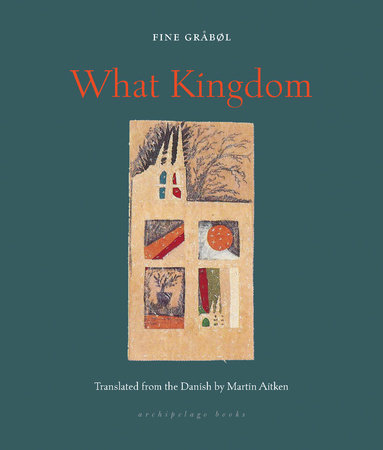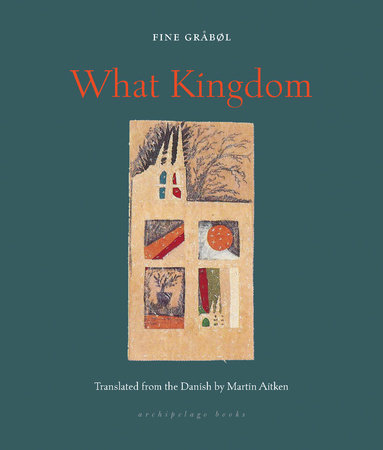“In this striking début novel, Gråbøl documents daily life in a psychiatric ward for young people in Denmark . . . Alternately lucid and ecstatic, the novel touches on the welfare system’s focus on bottom lines—’benefit rates and supplementary payments, diagnoses and deductibles’—and challenges the perception of mental illness as an invisible affliction . . . Gråbøl’s portrait of the residents’ and caretakers’ interconnected lives constructs a communal existence out of individual pain.” –– The New Yorker
“What Kingdom . . . [refuses] to choose a genre, to resemble a novel, a poem, or an essay entirely. Finely wrought scenes fall into the void, preceding only blank space, or else run into dead ends before undergoing resurrection as essayistic digressions or polemical paragraphs. Individual pages read like prose poems or fragments of songs: rhythmic, opaque, open to interpretation yet startling in their emotional specificity; renditions of illness I hadn’t previously heard but immediately recognized, synesthetic, amnesiac experiences of emotion set against time in the thick of the kind of pain people don’t respect—or are afraid to hear about out of fear of realizing they scribbled down a similar song once, and hid it away.” –– Emmeline Clein, The Los Angeles Review of Books
“[Gråbøl] tries to place us within her experience, conveying through an accumulation of acute details the alternately mundane and hallucinatory qualities of deep mental illness. . . . [She] effectively scrambles all sense of progress, highlighting the stop-start, backsliding reality of treatment. Hers is not a novel of overcoming or repudiating. What Kingdom is about the living-through and the living-with, about the hard-won routines of survival, and the remarkable persistence of a life from one day to the next.” –– Robert Rubsam, The Washington Post
“A series of short chapters convey the delimited space in which [What Kingdom’s narrator] lives as she ascribes human characteristics to the furniture in the room . . . Episodes of self-harm are disturbing to read but much of the writing is wistfully beautiful and so well translated that many of the short chapters – some just a few words – are worth reading more than once. There is a feeling of authenticity about every word of the novel.” – Declan O’Driscoll, The Irish Times
“Gråbøl, who previously published two collections of poetry . . . has a lyrical sensibility that shines through What Kingdom‘s impressionistic vignettes and prose. Nuggets of beauty can be found everywhere . . . It’s the novel’s visceral quality that makes it a deeply affecting read.” –– Lauren Booker, The Rumpus
“Before the relative independence of the residential facility, our narrator was locked in the psychiatric ward of a hospital and subjected to repeated electroconvulsive therapy . . . Gråbøl’s eye is unsparing and convincing, her prose vivid and alive . . . The narrator doesn’t deny that she needs help . . . But at the same time, she has questions: ‘Why doesn’t anyone wonder about the line between trauma and treatment?…about the relationship between compulsion and compliance?…care and abuse?…between surrender and obliteration?'” — Kirkus Reviews, starred review
“Gråbøl eschews the tropes on writing of psychiatric facilities and mental health. Scenes of physical struggle are not melodramatic but rather often distanced in the background, effectively eliminating the voyeuristic gaze . . . As the narrator casts her eyes on carpets, walls, windows, illuminating an aesthetic intentionality towards space, Gråbøl provides a humanizing view of the facility’s cast of residents, and a thoughtful critique of Denmark’s state support for those who seek mental health care.” –– Sophie van Well Groeneveld, The Brooklyn Rail
“Where less confident authors manipulate moments of rock-bottom misery to wrench the audience’s heartstrings, Gråbøl refuses to let ailments define her characters. These setbacks become part of the fabric of the facility, the ebb and flow of each day. Such frankness also fashions a narrator fully aware of her own tics and shortcomings, who dips into darkness without warning, yet who otherwise observes the world with transparency.” – Benjamin Woodard, On the Seawall
“It has been a privilege to read this extraordinary work. The unnamed narrator’s absolute vulnerability is transformed into compelling beauty by the authority and precision of her language. I love the pace of the writing. How, after a passage in which the raw pain and hurt break through into anger, a sentence of clear transcendent poetry can follow. The perfect emotional control is astonishing. It is a very exposing, brave book. It lays open the narrator’s frustration at her inability to be heard, to be considered, within the cold strictures of the institution where she passes her days: “the basis of our lives is powerlessness plus capitulation.” I was riveted by the attention to detail – it demands our attention, in return; the objective way the narrator perceives the confined world she lives in, without a trace of self-pity, compels us to know she is speaking the truth. There is an urgent need for the system to be changed, for an individual to be listened to, not just dealt with. This book makes us listen.” – Celia Paul, author of Self-Portrait and Letters to Gwen John
“An incredibly moving and gripping novel . . . so sure-footed, clear, vibrating, like chiffon or a cigarette.”
— Olga Ravn, author of The Employees and My Work
“Rendered through recursion and fragmentation, the wholeness of What Kingdom is revealed like a jigsaw puzzle whose pieces are kept in a shoebox and turns out to have no edges. Somehow both warm and cool, Fine Gråbøl’s keenly observant prose suggests the affinities between phantasm, phenomena and what lies between. Bureaucracy and self-inflicted burns—the banal and the brutal—are reported with the same attenuated precision. Only an unreliable narrator could be trusted with this story. This book has gotten inside me, a guide for unexplored rooms and corridors.”
— Anne de Marcken, author of It Lasts Forever and Then It’s Over
“This debut novel centers around the minute day-to-days of a patient in a mental hospital. Gråbøl, a Danish poet beloved by the likes of Olga Ravn and Celia Paul, weaves an intricate picture of a life lived under rules and restraint by creating a text that is simultaneously demure and porous, with an elliptical structure . . . This book is especially exciting because its publisher, Archipelago, rarely puts out debut fiction, and the cover features artwork by Karoline Ebbesen, a Danish painter who was admitted to a mental asylum in 1885 and lived there for the next 50 years.” — Dilara O’Neil, Vulture
“It has been a privilege to read this extraordinary work. The unnamed narrator’s absolute vulnerability is transformed into compelling beauty by the authority and precision of her language. I love the pace of the writing. How, after a passage in which the raw pain and hurt break through into anger, a sentence of clear transcendent poetry can follow. The perfect emotional control is astonishing. It is a very exposing, brave book. It lays open the narrator’s frustration at her inability to be heard, to be considered, within the cold strictures of the institution where she passes her days: “the basis of our lives is powerlessness plus capitulation.” I was riveted by the attention to detail – it demands our attention, in return; the objective way the narrator perceives the confined world she lives in, without a trace of self-pity, compels us to know she is speaking the truth. There is an urgent need for the system to be changed, for an individual to be listened to, not just dealt with. This book makes us listen.” – Celia Paul, author of Self-Portrait and Letters to Gwen John
“The sentences are short, truncated even, sometimes in a poetic way (‘Splendid hearts, free hands’) but often not . . . The brevity is beautiful, and also something more . . . [What Kingdom] warns of the increasing neoliberalization and capitalization of the Danish welfare state and the effects of this on an already strained and shrinking public health care system . . . What Kingdom [has a] thoroughgoing commitment to community and connection.” — Sherilyn Hellberg, Words Without Borders
“Gråbøl offers a searing critique on the way the government treats the mentally ill . . . Our narrator is preoccupied with the furniture . . . For her, chairs “address the night,” and this is a vital observation. Our protagonist notices everything. While we never get her name, the reader understands her survival is dependent on discovering herself through these inanimate objects . . . What Kingdom is a wonderful debut . . . a modern day classic; one I will return to time and time again.” — Courtenay Schembri Gray, The Maple Moon
“The novel is neither a ‘descent into madness’ nor the slow path to recovery; it more realistically portrays the narrative-free experience of mental illness . . . There is a sense of transformation: Marie dyes her hair, Lasse gives himself a buzz cut; the narrator puts on make-up; they begin to leave the institution. This may suggest hope, but such is tension instilled by the narrative voice that the reader will struggle to accept this . . . Beautifully written (and translated), What Kingdom is a novel that challenges the reader to enter a world that most will not experience, presenting it to us with openness and compassion.” –– First Readings
“A fragmented series of vignettes, What Kingdom is a kaleidoscopic work of fiction. Like a prism, it reflects the bits and pieces [of] intimate life in a psychiatric hospital . . . Its power comes not from its argumentation, but instead from its testimony.”
— Gregory Bruno, Asymptote
“What Kingdom is a necessary, compelling, and unflinching documentation of structures of care and the fragmentation of time they can occasion.”
— Vika Mujumdar, Necessary Fiction

























